人教版九年级英语第四单元知识点总结
人教版九年级英语第四单元知识点
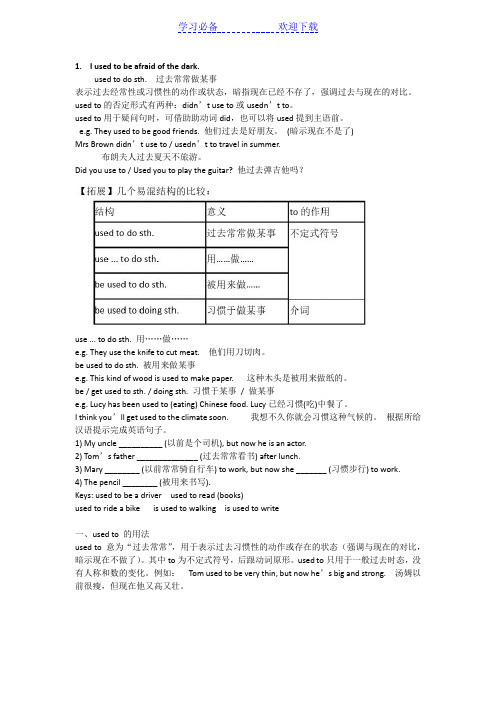
1.I used to be afraid of the dark.used to do sth. 过去常常做某事表示过去经常性或习惯性的动作或状态,暗指现在已经不存了,强调过去与现在的对比。
used to的否定形式有两种:didn’t use to或usedn’t to。
used to用于疑问句时,可借助助动词did,也可以将used提到主语前。
e.g. They used to be good friends. 他们过去是好朋友。
(暗示现在不是了)Mrs Brown didn’t use to / usedn’t to travel in summer.布朗夫人过去夏天不旅游。
Did you use to / Used you to play the guitar? 他过去弹吉他吗?use ... to do sth. 用……做……e.g. They use the knife to cut meat. 他们用刀切肉。
be used to do sth. 被用来做某事e.g. This kind of wood is used to make paper. 这种木头是被用来做纸的。
be / get used to sth. / doing sth. 习惯于某事/ 做某事e.g. Lucy has been used to (eating) Chinese food. Lucy已经习惯(吃)中餐了。
I think you’ll get used to the climate soon. 我想不久你就会习惯这种气候的。
根据所给汉语提示完成英语句子。
1) My uncle __________ (以前是个司机), but now he is an actor.2) Tom’s father ______________ (过去常常看书) after lunch.3) Mary ________ (以前常常骑自行车) to work, but now she _______ (习惯步行) to work.4) The pencil ________ (被用来书写).Keys: used to be a driver used to read (books)used to ride a bike is used to walking is used to write一、used to 的用法used to 意为“过去常常”,用于表示过去习惯性的动作或存在的状态(强调与现在的对比,暗示现在不做了)。
九上英语人教版第四单元知识点

九上英语人教版第四单元知识点一、重点单词。
1. humorous.- 形容词,意为“有幽默感的;滑稽有趣的”。
例如:The teacher is very humorous and we all like his classes.(这位老师很幽默,我们都喜欢他的课。
)- 其名词形式是“humor”,意为“幽默”。
2. silent.- 形容词,“不说话的;沉默的”。
例如:He remained silent all the time.(他一直保持沉默。
)- 相关短语“keep silent”(保持沉默)。
其名词形式是“silence”,例如:The silence in the room made me nervous.(房间里的寂静让我紧张。
)3. helpful.- 形容词,“有用的;有帮助的”。
例如:This book is very helpful for my study.(这本书对我的学习很有帮助。
)4. score.- 作名词时,意为“得分;进球”。
例如:His score in the math test is very high.(他在数学考试中的分数很高。
)- 作动词时,意为“得分;进球”。
例如:He scored two goals in the football match.(他在足球比赛中进了两个球。
)5. background.- 名词,“背景”。
例如:His family background is very ordinary.(他的家庭背景很普通。
)6. interview.- 作名词时,“面试;访谈;采访”。
例如:I have an interview tomorrow.(我明天有一个面试。
)- 作动词时,“采访;面试;对……进行面谈”。
例如:The reporter interviewed the famous singer.(记者采访了那位著名的歌手。
)7. dare.- 作实义动词时,意为“敢于;胆敢”,有人称和数以及时态的变化,后接动词不定式。
九年级英语人教版unit4知识点

九年级英语人教版unit4知识点Unit 4 Knowledge Points in Grade Nine English of People's Education PressIntroduction:In the Grade Nine English textbook of People's Education Press, Unit 4 covers various knowledge points that are essential for students to improve their English skills. This article will explore and discuss these knowledge points in depth, allowing students to have a clearer understanding of the unit and enhance their language proficiency.1. Vocabulary:Vocabulary plays a crucial role in language learning, enabling students to express themselves accurately and fluently. In Unit 4, students will come across a wide range of vocabulary related to different topics, such as travel, sports, hobbies, and emotions. It is essential for students to familiarize themselves with these words, understand their meanings, and learn how to use them appropriately in various contexts.2. Phrases and Idioms:Besides vocabulary, the unit also introduces various phrases and idioms that can enrich students' language and make their speech more native-like. For example, expressions like "go for a walk," "hit the gym," or "break a leg" are commonly used in English and can add color to students' conversations. By incorporating these phrases and idioms into their language practice, students can enhance their speaking and writing skills effectively.3. Grammar:Grammar forms the backbone of any language, providing the structure and rules necessary for effective communication. In Unit 4, students will review and learn several grammar concepts, including verb tenses, modal verbs, and conditionals. Understanding these grammar rules is essential for constructing accurate sentences and conveying the intended meaning. Through consistent practice and application, students can master these grammar points and improve their overall language proficiency.4. Reading Comprehension:Unit 4 includes various reading passages that aim to improve students' reading comprehension skills. These passages cover a range of topics, from environmental issues to personal experiences, allowing students to expand their knowledge while developing their readingabilities. By reading extensively and actively engaging with the texts, students can improve their comprehension, vocabulary, and critical thinking skills simultaneously.5. Listening Skills:Effective listening is a fundamental skill in language learning. Unit 4 provides numerous listening exercises that enable students to sharpen their listening skills and enhance their ability to understand spoken English. These exercises may feature dialogues, interviews, or monologues, covering different accents, speeds, and levels of complexity. Through regular practice, students can gradually improve their listening comprehension and become more proficient in understanding spoken English.6. Writing Practice:In Unit 4, students have the opportunity to practice various types of writing, such as descriptive, narrative, and persuasive writing. These writing tasks encourage students to express their ideas, thoughts, and experiences in a coherent and organized manner. By paying attention to the appropriate use of vocabulary, grammar, and sentence structure, students can develop their writing skills, foster creativity, and effectively communicate their thoughts on paper.Conclusion:Unit 4 of Grade Nine English in the People's Education Press textbook covers vital knowledge points necessary for students to enhance their language skills. By thoroughly understanding and practicing vocabulary, phrases, grammar, reading comprehension, listening, and writing, students can become more confident and proficient users of the English language. Regular and consistent practice, both in and outside the classroom, is key to achieving fluency and success in English communication.。
人教版九年级全一册第四单元知识点
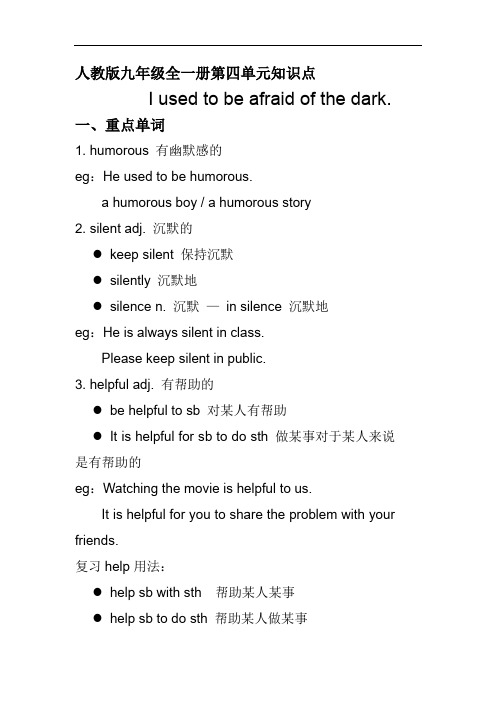
人教版九年级全一册第四单元知识点I used to be afraid of the dark.一、重点单词1. humorous 有幽默感的eg:He used to be humorous.a humorous boy / a humorous story2. silent adj. 沉默的●keep silent 保持沉默●silently 沉默地●silence n. 沉默—in silence 沉默地eg:He is always silent in class.Please keep silent in public.3. helpful adj. 有帮助的●be helpful to sb 对某人有帮助●It is helpful for sb to do sth 做某事对于某人来说是有帮助的eg:Watching the movie is helpful to us.It is helpful for you to share the problem with your friends.复习help用法:●help sb with sth 帮助某人某事●help sb to do sth 帮助某人做某事●with the help of sb 在某人的帮助下类似的词动词形式+ful构成形容词use - useful4.interview v. 面试,采访;n.面试,访谈●interview sb 采访/面试某人eg:She is a reporter. She always interviews famous people.I interviewed 24 people for the job.我面试了24个求职者。
●an interview 元音发音前用不定冠词,要用an●interviewee n.参加面试者,接受采访者●interviewer n.面试官,采访者5.deal 对付,对待●deal with 应对,处理常与how连用eg:He doesn’t know how to deal with the trouble.6.dare用法Eg:As she got better.She dared to sing in front of her class.●实义动词,敢于,胆敢●dare to do sth 敢于做某事eg:He doesn’t dare to speak English in front of his class●情态动词,敢于●dare do sth 敢于做某事eg:He dare not speak English in front of his class.7.private(私人的)与public(公共的)●private school 私立学校—public school 公立学校●private hospital 私立医院—public hospital 公立医院●in public 公开地;在公共场合下eg:I don’t have much private time.give a speech in public.Don’t smoking in public.8.absent adj.缺席的,不在场的—present 到场的●be absent from 缺席~~~eg:He was absent from the meeting because of the heavy rain.9.fail v.不及格,失败,未能做某事●fail the examination 考试不及格—pass the examination eg:He failed the examination in English.●fail to do sth 未能做某事—succeed in doing stheg:Jack failed to get up early.Lily succeeded in finishing her homework.10.examination n.考试exam是其缩写●have/take an examination 参加考试●pass the examination 考试及格●fail an examination 考试不及格11.take pride in 为···感到骄傲●=take pride in 为···感到骄傲eg:China has made great achievement.We really take pride in Our mother country.=We are really proud of our mother country.12.seldom 频度副词很少●seldom具有否定意义,含有seldom的句子相当于否定句,在反意疑问句中,附加疑问句要用肯定形式eg:Lily is seldom late for class,is she?13.influence v./n.影响●influence sb/stheg:The movie influenced us deeply.●be influenced by···被···影响eg:Tom is influenced by his father.●have an influence on sb 对···有影响eg:Family education has an important influence on children.14.辨析a number of与the number of● a number of相当于many,意为“许多,大量的”●后接+可数名词复数●作主语时,谓语动词用复数eg:There are a number of books in your schoolbag.A number of students in our class come from Beijing.●The number of···意为“···的数量”●后接+可数名词复数●作主语时,谓语动词用第三人称单数eg:The number of students in our class is 60.15.辨析alone与lonelyeg:He doesn’t dare to go out alone at night.(副词,作状语)My parents aren’t at home.I’m alone.(形容词,作表语)He lives alone and he feel lonely.(alone副词,作状语)(lonely形容词,作表语)16.give up用法动副短语-放弃●动副短语,代词放中间eg:Although the task(任务)is difficult,never give it up.●give up doing sth 放弃做某事eg:Don’t give up studying English.It is useful.17.其他重点短语●in person 亲自,亲身●in the past 在过去●from time to time 不时地●give a speech做演讲●wear glasses戴眼镜●turn red 变红●see sb doing sth 看见某人正在做某事●get good scores 取得好成绩=get good grades ●take up doing 开始从事做某事●in front of crowds 在人群前●all the time一直●not···anymore再也不···● a 19-year-old pop star一位19岁的流行歌星●hang out闲逛●think about考虑●be able to do能够做某事●tons of 很多的大量的=lots of●too much attention太多关注●get tons of attention得到大量关注●worry about 担心●be interested in sth/doing sth对做某事感兴趣●the road to success通向成功之路●look for寻找●take care of照顾=look after●make a decision做决定●advise sb to do sth建议某人做某事● a 5-hour bus ride一个5小时的车程●do well in在某方面做得好● a small number of ···少量的●send sb to sp 将某人寄送到哪里●have communication with sb 与某人交流●think of 想起认为●join the basketball team 加入篮球队●talk to sb 对某人谈话talk with sb 与某人交谈●cause some problems 引起一些问题,惹麻烦●even though 即使二、重点句型1.反意疑问句eg:You used to be short,didn’t you?●构成:陈述部分+附加疑问部分●遵循原则:前肯后否,前否后肯●She never stops studying hard every day,does she?反意疑问句的回答:●和一般疑问句的回答相同Yes,肯定结构/No,否定结构eg:You used to be good at English,didn’t you?Yes,I did 是的我擅长No,I didn’t 不,我不擅长●当回答陈述部分是否定句的反意疑问句时,yes和no 的汉语意思与本身意义相反,yes,意为“不”;no意为“是的”。
最全面人教版九年级英语全册第四单元知识点归纳总结
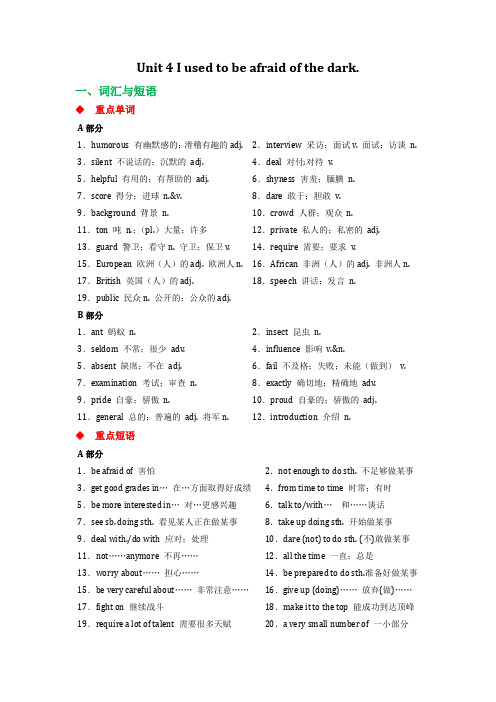
Unit 4 I used to be afraid of the dark.一、词汇与短语◆重点单词A部分1.humorous 有幽默感的;滑稽有趣的adj.2.interview 采访;面试v. 面试;访谈n. 3.silent 不说话的;沉默的adj.4.deal 对付;对待v.5.helpful 有用的;有帮助的adj.6.shyness 害羞;腼腆n.7.score 得分;进球n.&v.8.dare 敢于;胆敢v. 9.background 背景n.10.crowd 人群;观众n.11.ton 吨n.;(pl.)大量;许多12.private 私人的;私密的adj. 13.guard 警卫;看守n. 守卫;保卫v.14.require 需要;要求v. 15.European 欧洲(人)的adj. 欧洲人n.16.African 非洲(人)的adj. 非洲人n. 17.British 英国(人)的adj.18.speech 讲话;发言n.19.public 民众n. 公开的;公众的adj.B部分1.ant 蚂蚁n.2.insect 昆虫n.3.seldom 不常;很少adv.4.influence 影响v.&n.5.absent 缺席;不在adj.6.fail 不及格;失败;未能(做到)v. 7.examination 考试;审查n.8.exactly 确切地;精确地adv. 9.pride 自豪;骄傲n.10.proud 自豪的;骄傲的adj. 11.general 总的;普遍的adj. 将军n.12.introduction 介绍n.◆重点短语A部分1.be afraid of 害怕2.not enough to do sth. 不足够做某事3.get good grades in…在…方面取得好成绩4.from time to time 时常;有时5.be more interested in…对…更感兴趣6.talk to/with…和……谈话7.see sb. doing sth. 看见某人正在做某事8.take up doing sth. 开始做某事9.deal with./do with 应对;处理10.dare (not) to do sth. (不)敢做某事11.not……anymore 不再……12.all the time 一直;总是13.worry about……担心……14.be prepared to do sth.准备好做某事15.be very careful about……非常注意……16.give up (doing)……放弃(做)……17.fight on 继续战斗18.make it to the top 能成功到达顶峰19.require a lot of talent 需要很多天赋20.a very small number of 一小部分21.eat a lot of vegetables 吃大量的蔬菜22.listen to pop music 听流行音乐23.watch scary movies 看恐怖片24.at least 至少25.in public公开地;在别人(尤指生人)面前26.tons of许多的;大量27.give a speech 做演讲28.a number of许多;大量B部分1.make a decision做决定2.in person亲身;亲自3.even though即使;尽管4.take care of 照顾;照料5.be absent from 缺席;不在6.paint pictures 画画7.take pride in…为…感到自豪8.music classes 音乐课9.be proud of…为…骄傲;感到自豪10.on the soccer team 在足球队11.do well in……在……方面做得好12.work hard 学习努力13.make friends with sb. 和某人交朋友14.take care of/look after 照顾15.move to……搬到……16.feel lonely 感到孤独17.be absent from classes 旷课18.a boarding school 一所寄宿学校19.fail the exams/examinations 考试不及格20.advise sb. to do sth.建议某人做某事21.send…to…派……到……;送……到……22.look for 寻找23.have a great influence on sb. 对某人有很大影响◆重点句子A部分1.Mario, you used to be short, didn't you? 马里奥,你过去很矮,不是吗?2.It's been three years since we last saw our primary school classmates.我们上次见到小学同学已经三年了。
人教版九年级全一册英语Unit4单元语法知识点总结
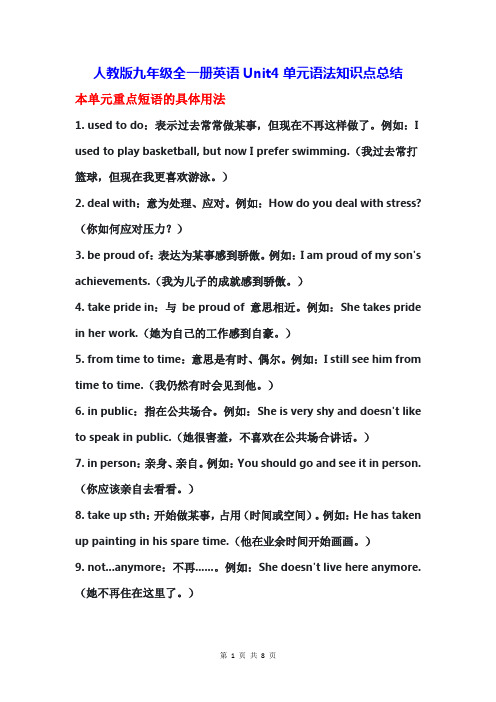
人教版九年级全一册英语Unit4单元语法知识点总结本单元重点短语的具体用法1. used to do:表示过去常常做某事,但现在不再这样做了。
例如:I used to play basketball, but now I prefer swimming.(我过去常打篮球,但现在我更喜欢游泳。
)2. deal with:意为处理、应对。
例如:How do you deal with stress?(你如何应对压力?)3. be proud of:表达为某事感到骄傲。
例如:I am proud of my son's achievements.(我为儿子的成就感到骄傲。
)4. take pride in:与be proud of 意思相近。
例如:She takes pride in her work.(她为自己的工作感到自豪。
)5. from time to time:意思是有时、偶尔。
例如:I still see him from time to time.(我仍然有时会见到他。
)6. in public:指在公共场合。
例如:She is very shy and doesn't like to speak in public.(她很害羞,不喜欢在公共场合讲话。
)7. in person:亲身、亲自。
例如:You should go and see it in person.(你应该亲自去看看。
)8. take up sth:开始做某事,占用(时间或空间)。
例如:He has taken up painting in his spare time.(他在业余时间开始画画。
)9. not...anymore:不再......。
例如:She doesn't live here anymore.(她不再住在这里了。
)10. worry about:担心、担忧。
例如:Don't worry about the exam, just do your best.(不要担心考试,尽力就好。
人教版英语九年级Unit4单元知识点归纳
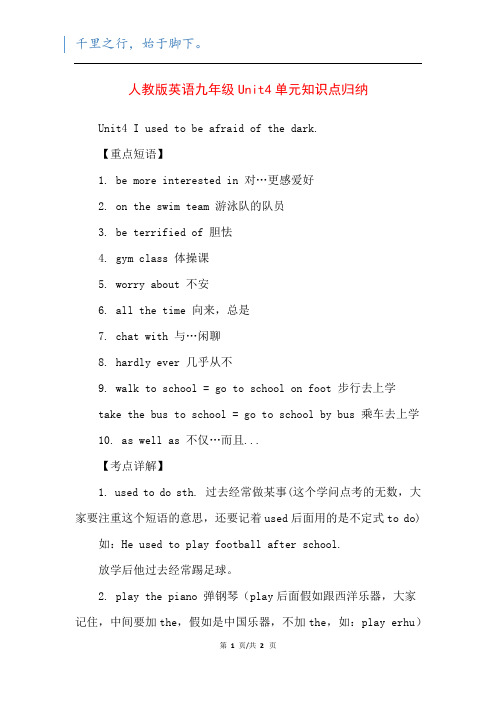
人教版英语九年级Unit4单元知识点归纳
Unit4 I used to be afraid of the dark.
【重点短语】
1. be more interested in 对…更感爱好
2. on the swim team 游泳队的队员
3. be terrified of 胆怯
4. gym class 体操课
5. worry about 不安
6. all the time 向来,总是
7. chat with 与…闲聊
8. hardly ever 几乎从不
9. walk to school = go to school on foot 步行去上学
take the bus to school = go to school by bus 乘车去上学
10. as well as 不仅…而且...
【考点详解】
1. used to do sth. 过去经常做某事(这个学问点考的无数,大家要注重这个短语的意思,还要记着used后面用的是不定式to do) 如:He used to play football after school.
放学后他过去经常踢足球。
2. play the piano 弹钢琴(play后面假如跟西洋乐器,大家
记住,中间要加the,假如是中国乐器,不加the,如:play erhu)。
初中英语 人教版 九年级全一册 Unit 4 知识点
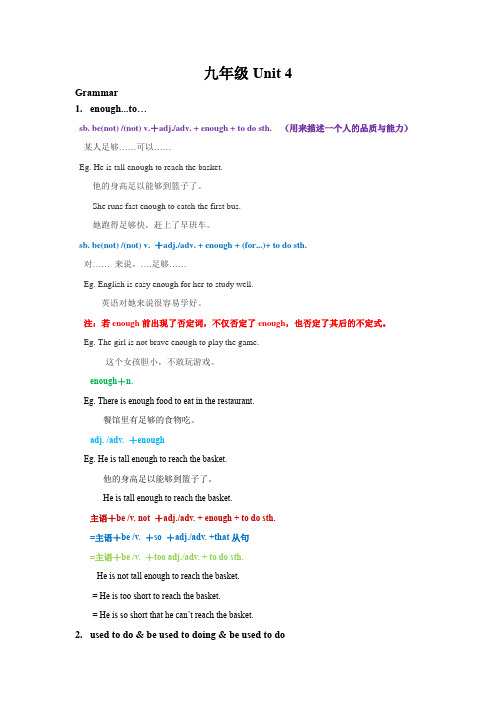
九年级Unit 4Grammar1.enough...to…sb. be(not) /(not) v.+adj./adv. + enough + to do sth. (用来描述一个人的品质与能力)某人足够……可以……Eg. He is tall enough to reach the basket.他的身高足以能够到篮子了。
She runs fast enough to catch the first bus.她跑得足够快,赶上了早班车。
sb. be(not) /(not) v. +adj./adv. + enough + (for...)+ to do sth.对…… 来说,….足够……Eg. English is easy enough for her to study well.英语对她来说很容易学好。
注:若enough前出现了否定词,不仅否定了enough,也否定了其后的不定式。
Eg. The girl is not brave enough to play the game.这个女孩胆小,不敢玩游戏。
enough+n.Eg. There is enough food to eat in the restaurant.餐馆里有足够的食物吃。
adj. /adv. +enoughEg. He is tall enough to reach the basket.他的身高足以能够到篮子了。
He is tall enough to reach the basket.主语+be /v. not +adj./adv.+ enough+ to do sth.=主语+be /v. +so +adj./adv.+that从句=主语+be /v. +too adj./adv.+ to do sth.He is not tall enough to reach the basket.= He is too short to reach the basket.= He is so short that he can’t reach the basket.ed to do & be used to doing & be used to doused to do sth. 过去常常做某事(现在不做了)主语适用于各种人称。
人教版九年级英语第四单元知识点总结
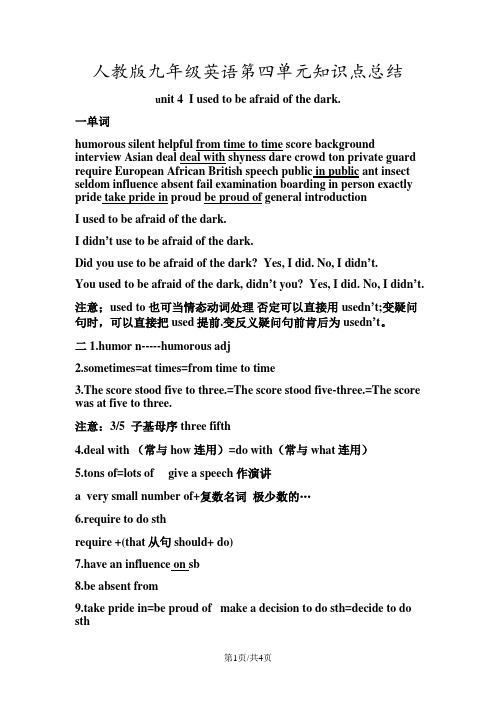
人教版九年级英语第四单元知识点总结u nit 4 I used to be afraid of the dark.一单词humorous silent helpful from time to time score background interview Asian deal deal with shyness dare crowd ton private guard require European African British speech public in public ant insect seldom influence absent fail examination boarding in person exactly pride take pride in proud be proud of general introductionI used to be afraid of the dark.I didn’t use to be afraid of the dark.Did you use to be afraid of the dark? Yes, I did. No, I didn’t.You used to be afraid of the dark, didn’t you? Yes, I did. No, I didn’t.注意;used to 也可当情态动词处理否定可以直接用usedn’t;变疑问句时,可以直接把used提前.变反义疑问句前肯后为usedn’t。
二1.humor n-----humorous adj2.sometimes=at times=from time to time3.The score stood five to three.=The score stood five-three.=The score was at five to three.注意:3/5 子基母序 three fifth4.deal with (常与how连用)=do with(常与what连用)5.tons of=lots of give a speech 作演讲a very small number of+复数名词极少数的…6.require to do sthrequire +(that从句 should+ do)7.have an influence on sb8.be absent from9.take pride in=be proud of make a decision to do sth=decide to do sthgive a general self-introduction fail the exam10.What’s sb like?(问外貌+性格)What does sb look like?(只问外貌)11.be on a swim team. get good grades on one’s exams12.such+a/an +adj+ n=so +adj +a/an+ n so+ adj/adv13.It has been three years since we last saw our primary school classmates.现在完成时标志词;since+时间点 for+ 时间段 in the last few years already yet ever so faruntil now recently these days/weeks/years注意:since后为一般过去时,主句用现在完成时have/has done ed to do sth 过去常常干某事be/get used to doing sth 习惯于干某事 be used to do sth=be used for doing sth 被用来做某事15.see/notice/ watch/look at/hear/listen to+ do(全过程)/ doing(正在做)16.take up1)从事,开始+doing sth He left a job in the city to take up farming.2)占据 The table takes up too much room.3)继续I put the telephone down and took up the work again.17.dare to do sth敢于做某事have to do sth 必须做某事(客观)=must do sth(主观)18.She is not shy anymore.=she is shy no more.not …anymore=no more(not置于be/助动词/情态动词之后)(no more通常置于句末)19.be able to=can能够 to one’s surprise令某人吃惊的是 to one’s +n pay attention to+ doing sth .....对做某事关注adj+ enough to do sth 足够…而能够做某事20.too much+ U/ too many+ C复太多的…..much too +adj 太….21.appear/disappear hang out with sbbe ready to do sth=prepare to do sth give up doing sth the roadto the successbooks on sth(关于….的书) at least/at mostwalk to school=go to school on foot wear the school uniforms all the timebe nervous about sth22.have difficulties/problems (in) doing sth23.cause problems另;使某人干某事 cause/get sb to do sth have/let/make sb do sth注意;变被动do要变成to do24.lonely 主观上孤单alone客观上一个人25.finally=at last=in the endbe afraid of doing sth=be terrified of doing sth=be afraid to do sth=be terrified to do sth26.advise sb to do sth/advise doing/advice that( shoud do)27.in person 亲自 even though=even if=although=though28.They are always thinking of me.be always doing sth常表达说话人的某种情绪。
人教版英语九年级Unit4单元知识点归纳

人教版英语九年级Unit4单元知识点归纳Unit 4: I Used to Be Afraid of the DarkWhen I was younger。
I used to be afraid of the dark。
Iwould always worry about what was XXX were under my bed orin my closet。
I would always sleep with a XXX.Despite my fear of the dark。
I was on the swim team and loved being in the water。
I also enjoyed gym class and being active。
I was more interested in sports than in reading or watching TV.I hardly ever walked to school。
I would always take the bus。
even though my school was not far from my house。
I would chat with my friends on the bus ride to school.As I got older。
my fear of the dark slowly went away。
I realized that there was nothing to be afraid of and that the dark wasjust a natural part of life。
Now。
I can sleep without a nightlight and am not afraid of the dark anymore.Looking back。
I realize that my fear of the dark was just a phase that I went through。
人教九年级英语unit4知识点

人教九年级英语unit4知识点Unit 4 Knowledge Points in Ninth Grade English TextbookAs ninth-grade students studying the English language, it is important for us to grasp the knowledge points within each unit. In this article, we will explore the key concepts and information covered in Unit 4 of our textbook. Let's dive in!1. Vocabulary Expansion:Unit 4 introduces us to a range of new vocabulary words, allowing us to expand our language skills. These words include "ambition," "athlete," "boundary," "duty," and "status." It is crucial to understand the meaning and usage of these words, as they will greatly enhance our comprehension and communication abilities.2. Grammar Excursion:One essential grammar concept covered in this unit is the past simple and past continuous tense. It is crucial to differentiate between the two and understand when to use each one. While the past simple tense refers to a completed action in the past, the past continuous tense emphasizes an ongoing action or an interrupted action in the past. Mastering this grammar point will provide us with the foundation toconstruct accurate and coherent sentences when discussing events or actions in the past.3. Reading Comprehension:Unit 4 revolves around the theme of ambition and success. Through various reading passages, we are exposed to inspiring stories of individuals who have overcome challenges to achieve their dreams. These passages not only improve our reading skills but also broaden our horizons by introducing us to different perspectives and experiences.4. Listening Practice:In Unit 4, we are given the opportunity to practice our listening skills through audio recordings. These recordings cover a range of topics related to ambition and success. By listening carefully and following the instructions, we can improve our ability to comprehend spoken English and sharpen our listening comprehension skills. Remember to take notes and pay attention to details while listening to the recordings.5. Writing Development:Unit 4 also encourages us to develop our writing skills. We are provided with writing tasks that allow us to express our ideas, opinions, and personal experiences. Through these activities, we can enhance our ability to communicate effectively in writing, employing proper grammatical structures and appropriate vocabulary.6. Cultural Insights:In addition to language skills, Unit 4 provides us with insights into different cultures. By exploring the stories and experiences of individuals from various backgrounds, we can develop a better understanding and appreciation for diversity. This cultural awareness not only broadens our knowledge but also promotes empathy and understanding towards others.7. Critical Thinking:Unit 4 challenges us to think critically and analyze the content we encounter. Through discussion questions and reflection activities, we are prompted to evaluate various aspects of ambition, success, and the pursuit of dreams. These exercises encourage us to develop our analytical skills and think beyond the surface level, fostering a deeper understanding of the topics covered.In conclusion, Unit 4 of our ninth-grade English textbook offers a wide range of knowledge points that are crucial to our language development. From vocabulary expansion to grammar exercises, reading comprehension to listening practice, writing development, cultural insights, and critical thinking, this unit provides a comprehensive learning experience. By dedicating ourselves to understanding and mastering these concepts, we can enhance our English language skills and cultivate a broader perspective on the world around us.。
Unit4笔记人教版英语九年级全册
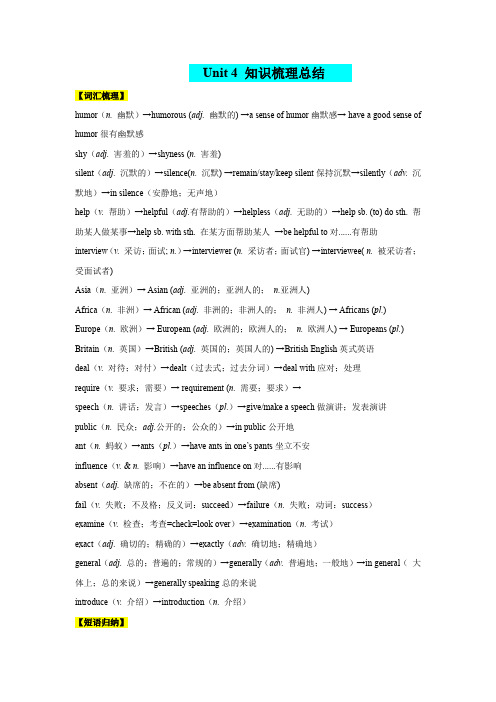
Unit 4 知识梳理总结【词汇梳理】humor(n.幽默)→humorous (adj. 幽默的) →a sense of humor幽默感→ have a good sense of humor很有幽默感shy(adj.害羞的)→shyness (n. 害羞)silent(adj.沉默的)→silence(n.沉默) →remain/stay/keep silent保持沉默→silently(adv.沉默地)→in silence(安静地;无声地)help(v.帮助)→helpful(adj.有帮助的)→helpless(adj.无助的)→help sb. (to) do sth. 帮助某人做某事→help sb. with sth. 在某方面帮助某人→be helpful to对......有帮助interview(v.采访;面试; n.)→interviewer (n.采访者;面试官) →interviewee( n.被采访者;受面试者)Asia(n.亚洲)→ Asian (adj. 亚洲的;亚洲人的;n.亚洲人)Africa(n.非洲)→ African (adj. 非洲的;非洲人的;n. 非洲人) → Africans (pl.)Europe(n.欧洲)→ European (adj. 欧洲的;欧洲人的;n. 欧洲人) → Europeans (pl.) Britain(n.英国)→British (adj. 英国的;英国人的) →British English英式英语deal(v.对待;对付)→dealt(过去式;过去分词)→deal with应对;处理require(v.要求;需要)→ requirement (n. 需要;要求)→speech(n.讲话;发言)→speeches(pl.)→give/make a speech做演讲;发表演讲public(n.民众;adj.公开的;公众的)→in public公开地ant(n.蚂蚁)→ants(pl.)→have ants in one’s pants坐立不安influence(v. & n. 影响)→have an influence on对......有影响absent(adj.缺席的;不在的)→be absent from (缺席)fail(v.失败;不及格;反义词:succeed)→failure(n.失败;动词:success)examine(v.检查;考查=check=look over)→examination(n.考试)exact(adj.确切的;精确的)→exactly(adv.确切地;精确地)general(adj.总的;普遍的;常规的)→generally(adv.普遍地;一般地)→in general(大体上;总的来说)→generally speaking总的来说introduce(v.介绍)→introduction(n.介绍)【短语归纳】be helpful to sb. 对某人有帮助get good scores/grades取得好成绩used to do sth.过去常常做某事from time to time=at times=sometimes时常;有时be interested in=have/show (an) interest in... 对......感兴趣dare to do 敢于做某事tons of很多;极多private school 私立学校public school 公立学校boarding school寄宿学校require sb.to do sth.要求某人作某事take up开始从事;占用(时间;空间)hang out闲逛give up/give it/them up 放弃/放弃它(们)give/make a speech做演讲;发表演讲in public公开地be nervous about...对......感到紧张all the time一直;总是have an influence on... 对......有影响be absent from... 缺席fail to do sth. 未能做某事in person亲身;亲自take an examination/pass the examination/fail the examination 参加考试/通过考试/考试不及格take pride in=be proud of 为......骄傲;感到自豪take care of=look after照顾look for jobs寻找工作generally speaking总的来说in general大体上;总的来说in the last few years 在过去的几年里(常用于现在完成时态)【考点总结】Section A1.This party is such a great idea!such非常,(强调程度)这样such+a/an+adj.+单数名词such+adj.+复数名词/不可数名词e.g. She is such a beautiful woman. =She is so beautiful a woman.I am surprised she made such great progress.2.It’s been three years since we last saw our primary school classmates.since conj.& prep.从......以后;自......以来;conj.因为;既然①作连词,意为“自......以后;自......以来”,连接时间状语从句,从句常用一般过去时;主句用完成时。
人教版九年级英语Unit4重点知识归纳

Unit4 I used to be afraid of the dark重点知识归纳一、词汇应用1.be silent in class在课堂上保持沉默2.be interested in ... 对……感兴趣3.on a basketball team 在篮球队4.from time to time 时常;有时5.turn red 变红6.get good scores on the exams 在考试中取得好成绩7.wear glasses 戴眼镜8.take up singing 开始唱歌9.deal with her shyness 克服她的羞怯10.not ... anymore 不再……11.in front of crowds 在众人面前12.all the time 频繁;反复13.get tons of attention 被众人所关注;吸引无数目光14.worry about ... / be worried about ... 担心……;担忧……15.be careful about ... 对……小心16.give up your normal life 放弃你正常的生活17.the road to success 成功之路18.fight on 奋力坚持下去;继续战斗19.require a lot of talent and hard work 需要很大的天赋和勤奋20.make it to the top 成功21.give a speech 发表演讲22.in public 公开地;在别人面前23.be nervous about tests 考试紧张24.do well in school 在学校表现好25.cause problems 制造麻烦26.take care of sb. 照顾某人27.influence his schoolwork 影响他的学业28.be absent from classes 缺课;缺勤29.fail his examinations 他考试不及格30.in person 亲身;亲自31.even though 即使;虽然32.think of sb. 想起某人33.become active in many other activities在许多别的活动中变得积极34.send sb. to a boarding school 将某人送到一所寄宿学校35.dare to do sth. 敢做某事36.make the decision to do sth. 决定做某事37.advise sb. to do sth. 建议某人做某事二、重点句型1.I used to be afraid of the dark.我过去常常前害怕黑暗.2.I go to sleep with my bedroom light on.我开着卧室的灯睡觉.3.I used to spend a lot of time playing games with my friends.以前我常常花很多时间和我的朋友们玩游戏.4.I hardly ever have time for concerts.我几乎没有时间去听音乐会.5.My life has changed a lot in the last few years.我的生活在过去几年里改变了很多.6.It will make you stressed out.那会使你紧张的.7.It seems that Yu Mei has changed a lot.玉梅似乎变化很大.三、词汇讲解1. silentsilent是形容词,意为“沉默的;无言的”,其名词形式为silence。
人教版九年级英语第四单元重点知识总结

人教版九年级英语第四单元重点知识总结一。
语法知识1.There be 句型- There be 句型用于描述某个地方存在某物或某人。
- 结构:There be + 主语 + 系动词 + 具体事物或人- 例句:There is a book on the desk.2.定语从句- 定语从句用于修饰一个名词,并给出该名词的更多信息。
- 常用关系代词有:that。
who。
whom。
whose。
which。
where。
when等。
- 例句:The boy who is ___.3.动词的时态- 英语动词的时态包括一般现在时、一般过去时、一般将来时等。
- 例句:She eats an apple every day.(一般现在时)- 例句:He went to school yesterday.(一般过去时)- 例句:I will go to Beijing next month.(一般将来时)二。
重点词汇1.放假- n- 例句:We have a two-week ___.2.周末- weekend- 例句:I like to relax on the weekend.3.喜欢- like- 例句:___.4.能够- can- 例句:I can swim.5.非常- very- 例句:___.6.还是- or- 例句:Do you ___?三。
重点句子1.What do you usually do on weekends?- 你周末通常做什么?- 例句:What do you usually do on weekends。
I usually play soccer.2.Can you swim?- 你会游泳吗?- 例句:Can you swim。
Yes。
I can.3.There is a book on the desk.- 桌子上有一本书。
- 例句:There is a book on the desk。
人教版丨九年级英语4单元必记知识点

人教版丨九年级英语4单元必记知识点Unit4 I used to be afraid of the dark.【重点短语】1. be more interested in 对…更感兴趣2. on the swim team 游泳队的队员3. be terrified of 害怕4. gym class 体操课5. worry about 担心6. all the time 一直,总是7. chat with 与…闲聊8. hardly ever 几乎从不9. walk to school = go to school on foot 步行去上学take the bus to school = go to school by bus 乘车去上学10. as well as 不仅…而且...【考点详解】1. used to do sth. 过去常常做某事(这个知识点考的很多,大家要注意这个短语的意思,还要记着used后面用的是不定式to do)如:He used to play football after school.放学后他过去常常踢足球。
2. play the piano 弹钢琴(play后面如果跟西洋乐器,大家记住,中间要加the,如果是中国乐器,不加the,如:play erhu)3. ①be interested in sth. 对…感兴趣②be interested in doing sth. 对做…感兴趣(对于这两个用法大家一定要掌握,切记切记)如:He is interested in math, but he isn't interested in speaking English. 他对数学感兴趣,但是他对说英语不感兴趣。
4. interested adj. 感兴趣的,指人对某事物感兴趣,往往主语是人interesting adj.有趣的,指某事物/某人具有趣味,主语往往是物(对于interested和interesting要区分清楚,一个主语往往是人,一个主语往往是物)5. be terrified of sth. 害怕……如:I am terrified of the dog.be terrified of doing sth. 害怕做……如:I am terrified of speaking.6. spend 动词,表示“花费金钱、时间”(spend和pay for它们的主语都是人,这一点大家要清楚)①spend…on sth. 在某事上花费(金钱、时间)(重要考点)②spend…(in)doing sth. 花费(金钱、时间)去做某事(重要考点,尤其要注意动名词,也就是动词的ing形式)如:He spends too much time on clothes. 他花费太多的时间在衣着上。
人教版英语九年级全一册第四单元知识点整理
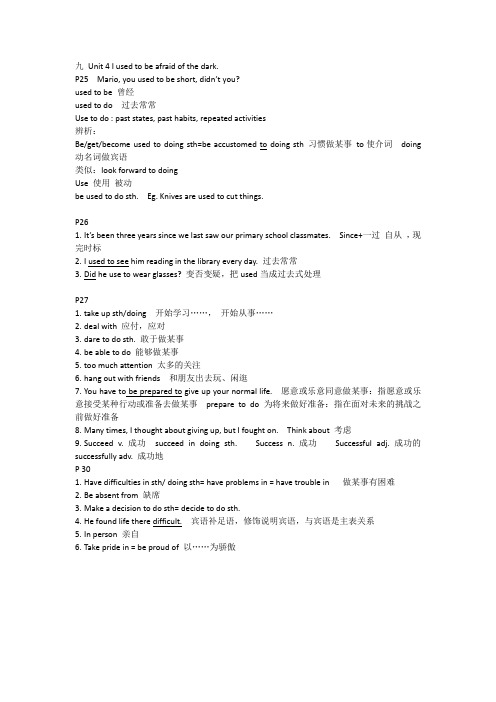
九Unit 4 I used to be afraid of the dark.P25 Mario, you used to be short, didn’t you?used to be 曾经used to do 过去常常Use to do : past states, past habits, repeated activities辨析:Be/get/become used to doing sth=be accustomed to doing sth 习惯做某事to使介词doing 动名词做宾语类似:look forward to doingUse 使用被动be used to do sth. Eg. Knives are used to cut things.P261.It’s been three years since we last saw our primary school classmates. Since+一过自从,现完时标2.I used to see him reading in the library every day. 过去常常3.Did he use to wear glasses? 变否变疑,把used当成过去式处理P271.take up sth/doing 开始学习……,开始从事……2.deal with 应付,应对3.dare to do sth. 敢于做某事4.be able to do 能够做某事5.too much attention 太多的关注6.hang out with friends 和朋友出去玩、闲逛7.You have to be prepared to give up your normal life. 愿意或乐意同意做某事:指愿意或乐意接受某种行动或准备去做某事prepare to do 为将来做好准备:指在面对未来的挑战之前做好准备8.Many times, I thought about giving up, but I fought on. Think about 考虑9.Succeed v. 成功succeed in doing sth. Success n. 成功Successful adj. 成功的successfully adv. 成功地P 301.Have difficulties in sth/ doing sth= have problems in = have trouble in 做某事有困难2.Be absent from 缺席3.Make a decision to do sth= decide to do sth.4.He found life there difficult. 宾语补足语,修饰说明宾语,与宾语是主表关系5.In person 亲自6.Take pride in = be proud of 以……为骄傲。
2020秋人教版英语九年级Unit4Iusedtobeafraidofthedark.知识点总结
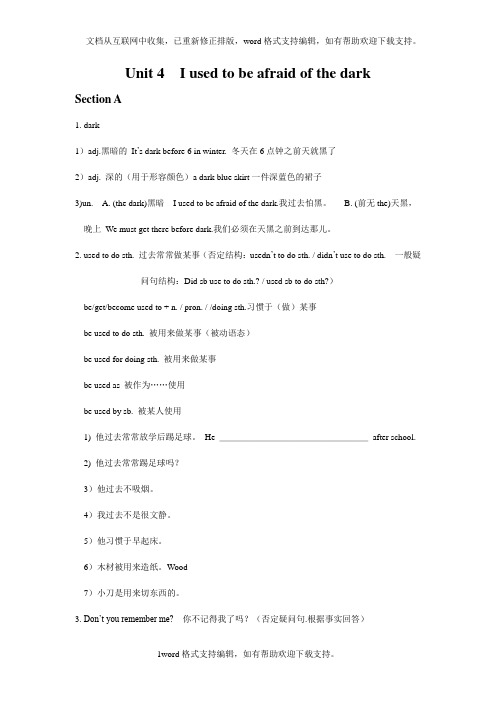
Unit 4 I used to be afraid of the dark Section A1. dark1)adj.黑暗的It’s dark before 6 in winter. 冬天在6点钟之前天就黑了2)adj. 深的(用于形容颜色)a dark blue skirt一件深蓝色的裙子3)un. A. (the dark)黑暗I used to be afraid of the dark.我过去怕黑。
B. (前无the)天黑,晚上We must get there before dark.我们必须在天黑之前到达那儿。
2. used to do sth. 过去常常做某事(否定结构:usedn’t to do sth. / didn’t use to do sth. 一般疑问句结构:Did sb use to do sth.? / used sb to do sth?)be/get/become used to + n. / pron. / /doing sth.习惯于(做)某事be used to do sth. 被用来做某事(被动语态)be used for doing sth. 被用来做某事be used as 被作为……使用be used by sb. 被某人使用1) 他过去常常放学后踢足球。
He _________________after school.2) 他过去常常踢足球吗?3)他过去不吸烟。
4)我过去不是很文静。
5)他习惯于早起床。
6)木材被用来造纸。
Wood7)小刀是用来切东西的。
3. Don’t you remember me? 你不记得我了吗?(否定疑问句.根据事实回答)Yes, I do. 不, 我记得. No, I don’t 是的, 我不记得了4. wait a minute 等一等5. be more interested in 对…更感兴趣.6. be on the swim team = be a member of the swim team 在游泳队效力(是游泳队队员)7. sure1) adj.“确信的,确实的,一定……的”①be sure of sth确信某事②be sure+that从句:确信……③be sure to do sth必定会做某事2) adv ①无疑,确实②好,当然,没问题(用于应答)A.他深信自己会成功。
人教版九年全一册Unit4 I used to be afraid 知识点总结(含短语句型精讲作文)
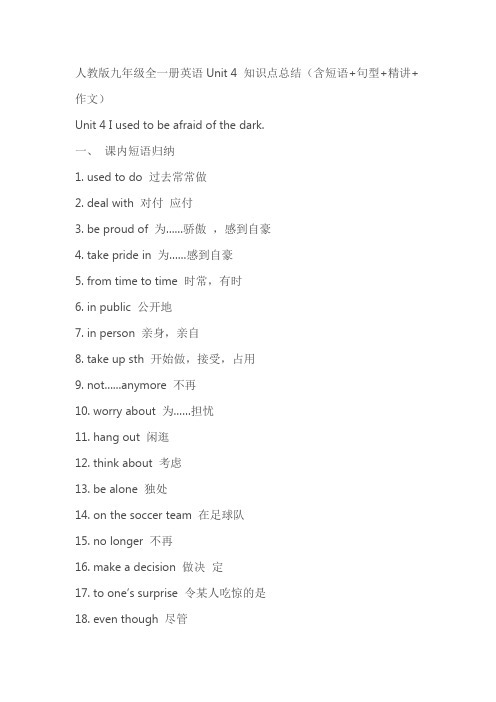
人教版九年级全一册英语Unit 4 知识点总结(含短语+句型+精讲+作文)Unit 4 I used to be afraid of the dark.一、课内短语归纳1. used to do 过去常常做2. deal with 对付应付3. be proud of 为……骄傲,感到自豪4. take pride in 为……感到自豪5. from time to time 时常,有时6. in public 公开地7. in person 亲身,亲自8. take up sth 开始做,接受,占用9. not……anymore 不再10. worry about 为……担忧11. hang out 闲逛12. think about 考虑13. be alone 独处14. on the soccer team 在足球队15. no longer 不再16. make a decision 做决定17. to one’s surprise 令某人吃惊的是18. even though 尽管19. pay attention to 对……注意,留心20. in the last few years 在过去的几年里21. be afraid of 害怕22. turn red 变红23. tons of attention 很多关注24. be careful 当心25. give up 放弃26. a very small number of …极少数的……27. give a speech 作演讲28. all the time 一直总是29. be interested in 对……感兴趣30. change one’s li fe 改变某人的生活31. take care of 照顾32. one of… ……之一二、重点词汇解析1. silentsilent是形容词,意为“沉默的;无言的”,其名词形式为silence。
九年级英语人教版第四单元知识点汇总

23. be absent from缺席…
24. fail the exam \ examination \ test考试不及格
pass the~考试及格(通过)
take\have a (an) ~进行测试
25. boarding school寄宿学校
8years old后不接名词
giveup放弃
not … anymore不再
三、单词辨析
1.preparetodo准备做 (比较随意)
bepreparedto do准备做 (比较严肃)
I prepare to cook some food.我准备去做点吃的。
I am prepared to interview.我准备去面试。
2.8-year-old后接名词
He used to get up late but he is used tΒιβλιοθήκη getting up early.
2.be afraid of + doing \ 名词“害怕…”
be afraid to + do “害怕…”
be afraid that +从句“恐怕;害怕”
3.get good scores\marks得到好的分数(成绩)
18. do well in …在….做的好be good at…擅长…
19.cause problems惹事
20. go\come \ get \ travel \ move \ appear\returnto +某地(表示位移的词)
21. look for a job (寻)找工作findajob找(到)工作
人教版九年级Unit4知识点总结
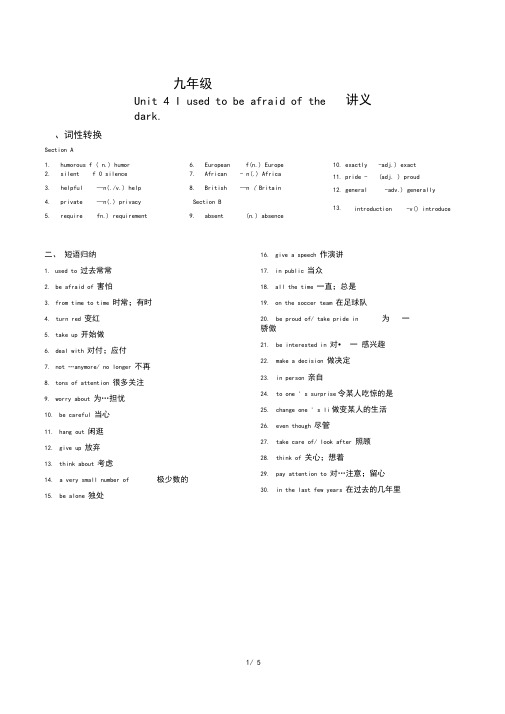
九年级Unit 4 I used to be afraid of thedark.、词性转换Section A1. humorous f ( n.) humor 6. European f(n.) Europe 10. exactly -adj.) exact2. silent f 0 silence 7. African - n(.) Africa11. pride - (adj. ) proud3. helpful —n(./v.) help 8. British —n ( Britain 12. general -adv.) generally4. private —n(.) privacy Section B13. introduction -v() introduce 5. require fn.) requirement 9. absent (n.) absence二、短语归纳ed to 过去常常2.be afraid of 害怕3.from time to time 时常;有时4.turn red 变红5.take up 开始做6.deal with 对付;应付7.not …anymore/ no longer 不再8.tons of attention 很多关注9.worry about 为…担忧10.be careful 当心11.hang out 闲逛12.give up 放弃13.think about 考虑14. a very small number of 极少数的15.be alone 独处16.give a speech 作演讲17.in public 当众18.all the time 一直;总是19.on the soccer team 在足球队20.be proud of/ take pride in 为♦一骄傲21.be interested in 对•一感兴趣22.make a decision 做决定23.in person 亲自24.to one ' s surprise令某人吃惊的是25.change one ' s li做变某人的生活26.even though 尽管27.take care of/ look after 照顾28.think of 关心;想着29.pay attention to 对…注意;留心30.in the last few years 在过去的几年里讲义10.take up doing sth. 开始做某事2.be afraid of doing sth. 害怕做某事3.have to do sth. 必须做某事4.make sb. do sth. 让某人做某事5.give up doing sth. 放弃做某事6.try to do sth. 尽力做某事7.adj. + enough to do sth. 足够…而能够做某事8.be prepared to do sth. 准备做某事9.see sb. doing sth. 看见某人在做某事11.begin to do sth. 开始做某事12.require sb. to do sth. 要求某人做某事13.decide to do sth. 决定做某事14.make a decision to do sth. 决定做某事15.It's hard to believe that …很难相信…16.It has been + 一段时间+ since + 从句自从•一以来已经有很长时间了17.dare to do sth. 敢于做某事1. used to do sth. 过去常常做某事18. It’s + adj. + for sb. + to do sth.对某人来说做某事是…的三.重点句子I.She was never brave enough to ask questions. 她从来不够勇敢而不敢问问题。
- 1、下载文档前请自行甄别文档内容的完整性,平台不提供额外的编辑、内容补充、找答案等附加服务。
- 2、"仅部分预览"的文档,不可在线预览部分如存在完整性等问题,可反馈申请退款(可完整预览的文档不适用该条件!)。
- 3、如文档侵犯您的权益,请联系客服反馈,我们会尽快为您处理(人工客服工作时间:9:00-18:30)。
人教版九年级英语第四单元知识点总结
unit 4 I used to be afraid of the dark.
一单词
humorous silent helpful from time to time score background interview Asian deal deal with shyness dare crowd ton private guard require European African British speech public in public ant insect seldom influence absent fail examination boarding in person exactly pride take pride in proud be proud of general introduction
I used to be afraid of the dark.
I didn’t use to be afraid of the dark.
Did you use to be afraid of the dark Yes, I did. No, I didn’t.
You used to be afraid of the dark, didn’t you Yes, I did. No, I didn’t.
注意;used to 也可当情态动词处理否定可以直接用usedn’t;变疑问句时,可以直接把used提前.变反义疑问句前肯后为usedn’t。
二 n-----humorous adj
=at times=from time to time
score stood five to three.=The score stood five-three.=The score was at five to three.
注意:3/5 子基母序 three fifth
with (常与how连用)=do with(常与what连用)
of=lots of give a speech 作演讲
a very small number of+复数名词极少数的…
to do sth
require +(that从句 should+ do)
an influence on sb
absent from
pride in=be proud of make a decision to do sth=decide to do sth
give a general self-introduction fail the exam
’s sb like(问外貌+性格)
What does sb look like(只问外貌)
on a swim team. get good grades on one’s exams
+a/an +adj+ n=so +adj +a/an+ n so+ adj/adv
has been three years since we last saw our primary school classmates.
现在完成时标志词;since+时间点 for+ 时间段 in the last few years already yet ever so far until now recently these days/weeks/years
注意:since后为一般过去时,主句用现在完成时have/has done
to do sth 过去常常干某事
be/get used to doing sth 习惯于干某事 be used to do sth=be used for doing sth 被用来做某事
notice/ watch/look at/hear/listen to+ do(全过程)/ doing(正在做)
up
1)从事,开始+doing sth He left a job in the city to take up farming.
2)占据The table takes up too much room.
3)继续I put the telephone down and took up the work again.
to do sth敢于做某事
have to do sth 必须做某事(客观)=must do sth(主观)
is not shy anymore.=she is shy no more.
not …anymore=no more(not置于be/助动词/情态动词之后)(no more通常置于句末)
able to=can能够 to one’s surprise令某人吃惊的是 to one’s +n
pay attention to+ doing sth .....对做某事关注
adj+ enough to do sth 足够…而能够做某事
much+ U/ too many+ C复太多的…..
much too +adj 太….
disappear hang out with sb
be ready to do sth=prepare to do sth give up doing sth the road to the success
books on sth(关于….的书) at least/at most
walk to school=go to school on foot wear the school uniforms all the time
be nervous about sth
difficulties/problems (in) doing sth
problems
另;使某人干某事 cause/get sb to do sth have/let/make sb do sth
注意;变被动do要变成to do
主观上孤单alone客观上一个人
=at last=in the end
be afraid of doing sth=be terrified of doing sth=be afraid to do sth=be terrified to do sth
sb to do sth/advise doing/advice that( shoud do)
person 亲自 even though=even if=although=though
are always thinking of me.
be always doing sth常表达说话人的某种情绪。
如赞扬不满责备等。
How I've changed!
My life changed a lot in the last few years. I used to be short and have long hair ,but now I am tall and have short hair ,I used to be quiet and shy , but now I am very outgoing .I used to be afraid of dark ,and now I am not .I used to be heavy ,and now I am thin and healthy .
My daily life is different. For example, I didn't use to like tests. Now, I don't mind them. I used to hate gym class. Now it's my favorite class.
I used to walk to school. Now, I take the bus .when I was young, I used to have so much time to play with my friends ,but now I am really too busy ,I have to get up early and stay in school all day ,then I go right home and eat dinner at night. I used to watch TV with my parent or chat with my grandmother ,but now I can't .I used to love sports ,but now ,I hardly ever have time to play sport. I have to do lots of homework .I really miss the old days!
补充make it
一、表示某人做成某事
You needn’t worry; he will make it. 你不必担心,他会办成的。
I can’t make it on Friday. 星期五我办不好。
三、用来表示规定时间,常与can, let等词连用。
例如:
A:Shall we meet next week下星期我们见面,好吗
B:Yes. Let's make it next Sunday.好的,让我们约定下星期日吧。
A:Can you make it tomorrow明天行吗。
